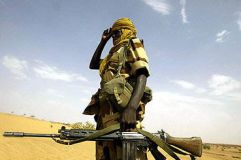Darfur talks resume with presence of rebel groups leaders
ABUJA, June 10 (AFP) — African Union-mediated talks to resolve the civil war in Sudan’s western region of Darfur which has claimed between 180,000 and 300,000 lives and displaced 2.4 million people resumed after a six month break.

|
|
A rebel of the Justice and Equality Movement (JEM), fighting Sudanese troops, mans a post in the northern part of the western Sudanese Darfur. (AFP). |
The new round taking place in Abuja brought the Sudanese government together again with the rebel Sudan Liberation Movement (SLM) and Justice and Equality Movement (JEM).
The rebel group leaders, Mohammed Al-Nour and Ibrahim Khalil respectively, were attending for the first time, while Agriculture Minister Majzoub al-Khalifa, as usual, headed the government side.
The delegates later adjourned for a closed-door meeting to draw up the agenda for the negotiations, which were expected to resume fully on Saturday.
AU commission head Alpha Oumar Konare had informal discussions with representatives of the three parties before declaring the talks open.
Konare said he hoped that “this phase of talks will be the last one”.
Although it was not yet known how long the talks will last, AU officials said they did not expect them to go beyond three weeks.
The AU’s chairman and host of the talks, Nigerian President Olusegun Obasanjo, appealed to all the warring parties to work toward peace in Darfur in a speech read on his behalf by government secretary Uffot Ekaette.
“No efforts should be spared by the parties in reaching agreement on the cessation of attacks, intimidation and other forms of violence against civilians,” he said.
“All the parties must refrain from violence that could put in danger the lives of innocent civilians and abide by the agreements already entered into.”
Obasanjo was out of Nigeria on a European trip but expected back later Friday.
AU special envoy to Sudan Salim Ahmed Salim praised the delegates for their attendance, urging them to reach a consensus on issues before the talks.
“It is my hope that this session will be constructive. The decision on the part of the Sudanese parties in the conflicts to dialogue should be commended because it signals their determination to move the process forward,” he said.
The Abuja peace talks which began in August 2004 were suspended in December to allow for more consultations among the warring parties, who were accusing each other of violating the ceasefire agreements.
Violence broke out in Darfur in February 2003 when the Khartoum authorioties unleashed Arab militias known as Janjaweed on a scorched-earth campaign to quell a rebel uprising against the government.
The Janjaweed are accused of ethnic cleansing, torture, rape and intimidation against the minority black population in Darfur with the connivance of the government.
The International Criminal Court (ICC) announced Monday that it had launched an inquiry into war crimes allegedly committed in the Darfur region, in a move which was welcomed by the rebels but brought a government warning that it could jeopardise peace moves.
Humanitarian officials have warned that the situation in Darfur is growing more desperate. There is not enough funding to meet the crisis caused by drought, famine and the long-term effects of conflict, and the situation has been worsened by recent clashes between the rebel movements.
According to the AU mission in Darfur, violent clashes between the SLM and JEM last week claimed 11 lives while 17 others were injured.
In Geneva Friday an official of the UN Office for Coordination of Humanitarian Affairs, Elisabeth Byrs, said that aid received for Darfur was enough for only 55 percent of needs.
The AU announced late last month it had received 292 million dollars in donations. But it wants more than 460 million dollars in cash, military equipment and logistical support to boost the AU force monitoring the Darfur truce from the current 2,700 soldiers — from Nigeria and Rwanda — to more than 7,700 by September.
The North Atlantic Treaty Organisation and European Union agreed Thursday to move swiftly to help expand the AU peacekeeping force with an airlift of some 5,000 troops to Darfur, possibly as early as July.
A high AU delegation was in Darfur last weekend to assess humanitarian needs, after UN Secretary General Kofi Annan visited the region and called on the international community to find a rapid solution to the crisis.
